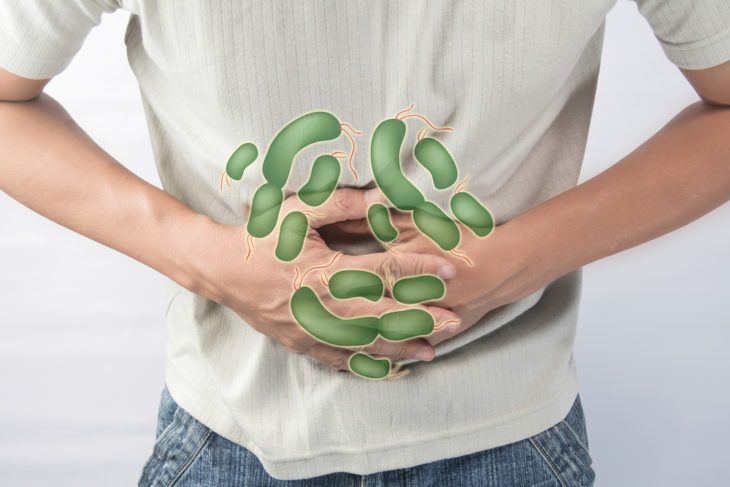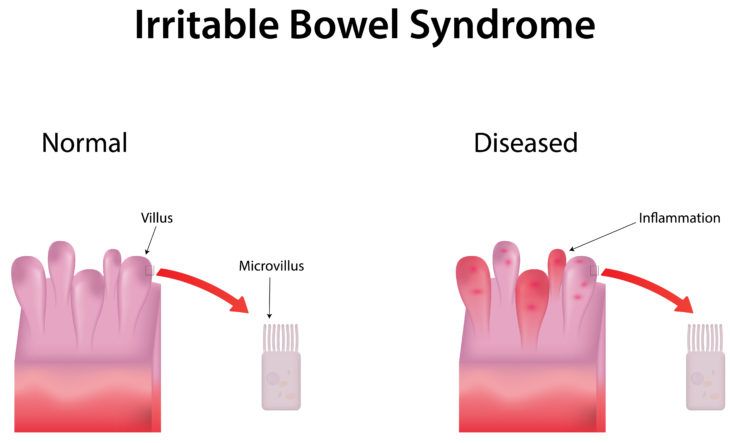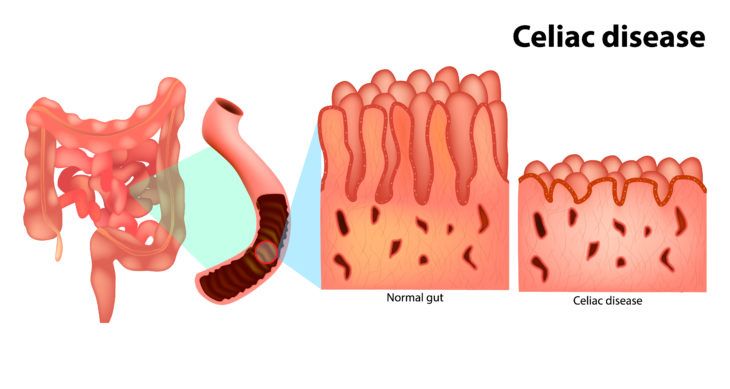After a particularly fatty feast or bout of the flu, diarrhea often rears its gassy, bloated, and uncomfortable presence. A spell of it often consists of loose, watery bowel movements that come on suddenly and leave you hesitant to be far from a bathroom.
Typically, diarrhea occurs due to a virus, such as a stomach flu, in the digestive system, lasting no more than a few days. However, long-term or frequent affliction can indicate other chronic diseases within the large intestine (or colon).
Here are the 12 most common causes of diarrhea…
1. Bacterial or Viral Infection
Infections from either bacteria, viruses, or parasites typically cause sudden diarrhea (clinically known as acute diarrhea). The Mayo Clinic lists Norwalk virus, cytomegalovirus, rotavirus, and viral hepatitis as some of the most common viral infections causing diarrhea. Another common one is the norovirus. Health.com notes that there have been several outbreaks of this virus in close quarters, including cruise ships, nursing homes, schools, and prisons because it spreads so quickly from person to person. Thankfully, stomach bugs from viral infections tend to work their way out of the body within a few days.
Similar to viral infections, there are many bacterial infections that can enter the body through contaminated water or food (digestive tract infections that are spread through food or water are called food-borne illnesses). The National Institute of Diabetes and Digestive and Kidney Diseases (NIDDK) lists Campylobacter, Escherichia coli, Salmonella, and Shigella as the most common for causing diarrhea.
Bacterial infections will not go away quickly on their own without treatment. NIDDK also notes that some people may have trouble digesting certain foods such as carbohydrates, lactose, or proteins, after suffering from an infection.
2. Food Poisoning
You’ll quickly notice after reading this list that contaminated food and water are the main gateways for bacteria, viruses, and parasites to find their way into your body and cause diarrhea. It can also cause vomiting and an upset stomach.
The most common culprits are E. coli, Salmonella, Campylobacter, Shigella, and Listeria. This bacteria is commonly found in foods, including eggs, raw and undercooked meats, shellfish, unpasteurized milk, and raw vegetables. They can also make their way into food that isn’t properly stored.
Always make sure that the product is washed thoroughly before eating. Be diligent about cooking meat, poultry, and fish. You must always wash your hands well before and after handling food and be sure to clean any surfaces that have come into contact with food.
3. Traveler’s Diarrhea
Traveler’s diarrhea is a term that has been coined due to the fact that so many people fall ill with acute diarrhea when traveling abroad. Another nickname is “Montezuma’s revenge,” says Health.com. Like many of the other causes on this list, traveler’s diarrhea comes about from eating food or drinking water that has been contaminated with bacteria, viruses, or parasites. It often happens because your body is not used to the microbes found in other countries and depending on where you are, their hygiene practices may be different.
There are many steps a traveler can take to avoid diarrhea. “Usually, the advice is to be careful: If you can’t peel it, don’t eat it. No tap water, and no ice,” says Lawrence Schiller, MD, a past President of the American College of Gastroenterology, to Health.com. Make sure the food is well cooked, drink bottled beverages, don’t brush your teeth with tap water, don’t eat from street vendors, and ask a doctor about prophylactic antibiotics or other medications before traveling.
4. Food Intolerance
One of the most common food intolerances is lactose intolerance, a sugar (lactose) found in all dairy products. “People who have difficulty digesting lactose have diarrhea after eating dairy products,” says the Mayo Clinic. This food intolerance can become worse with age as the levels of enzymes that help digest lactose drop after childhood, explains the source.
Another common food intolerance is fructose (the sugar found in fruits and honey), which is sometimes added to certain beverages like soft drinks, as well as to artificial sweeteners such as sorbitol, xylitol, and mannitol, which are commonly found in chewing gum and other sugar-free products. They can cause diarrhea in otherwise healthy people, says the Mayo Clinic.
An allergy to soy, cereal grains, eggs, and seafood may also cause diarrhea.
5. Stomach Flu
The stomach flu, also known as gastroenteritis, is caused by a virus. Even though it’s referred to as the stomach flu, it’s not caused by the flu (influenza). The most common stomach flu viruses are rotavirus and norovirus. “Gastroenteritis also can be caused by a bacterium or a parasite. You can generally care for your stomach flu with home treatment,” says VeryWell Health.
Young children, the elderly, or anyone with a compromised immune system should be monitored carefully, because they have a higher risk of becoming dehydrated while ill. Keep a close eye out for any other complications.
6. Certain Medications
Ironically enough, medication used to treat and heal our bodies, such as antibiotics, can cause diarrhea. This occurs because antibiotics are designed to destroy both good and bad bacteria in the body, which disrupts the natural balance of bacteria in the intestines, says the Mayo Clinic. As a result, this increases a person’s chances of becoming infected with Clostridium difficile.
Other medications known for causing diarrhea are cancer drugs, certain blood pressure medications, nonsteroidal anti-inflammatory drugs (NSAIDs) as well as antacids with magnesium.
7. Irritable Bowel Syndrome
Irritable bowel syndrome (IBS) is a major cause of diarrhea. This gastrointestinal disorder causes an array of symptoms that often occur at the same time, including bloating, diarrhea, constipation, and overall discomfort. Health.com explains that the symptoms associated with the condition vary depending on the person. Some people with IBS will experience more diarrhea, while others tend to have more constipation. More often, people with IBS will alternate between the two.
While the exact cause of IBS is unknown, experts believe there is some link with how the brain communicates with the gut, as well as changes in the balance of gut bacteria. Unfortunately, there isn’t much a person can do about IBS, except take medication to keep the symptoms at bay and keep a food diary to learn what foods may be triggering their symptoms. Certain foods (e.g., fast foods or highly processed foods) have been known to make the symptoms worse.
8. Inflammatory Bowel Disease
Inflammatory bowel disease (IBD) is often confused with IBS, most likely due to the fact that their names are so similar. However, they are completely different (to learn more about their differences read our article on Everything to Know About Irritable Bowel Syndrome vs. Irritable Bowel Disease). People with IBD will have structural damage or some kind of physical damage to their digestive system. It’s also used as an umbrella term for conditions such as Crohn’s disease and ulcerative colitis. Health.com explains that both conditions cause the digestive tract to become inflamed, inhibiting the body’s ability to absorb and deliver nutrients.
While these two conditions are quite different, Crohn’s disease can occur anywhere along the gastrointestinal tract, while ulcerative colitis only targets the lining of the colon, both will result in diarrhea. “Experts aren’t sure what causes the two conditions, but it looks like genetics and the immune system are involved,” writes the source. There is no cure or real effective treatment for either condition. If you are diagnosed with either Crohn’s disease or ulcerative colitis, your doctor will likely have you try different diets and medications to help ease the symptoms.
9. Celiac Disease
Celiac disease is an autoimmune disease that affects only 1 percent of the population, notes Health.com. Similar to IBS, experts aren’t sure what causes celiac disease, but it’s clear that the symptoms become worse when people with celiac disease eat gluten, a type of protein found in wheat, barley, and rye. One of the most common symptoms associated with celiac disease is diarrhea. Other symptoms include bloating, fatigue, nausea, vomiting, constipation, gas, and weight loss.
The best way to treat celiac disease is to follow a gluten-free diet. This is important because the effects of celiac disease can be extremely harmful. Celiac disease can lead to “damage of the lining of the intestine, anemia, and difficulty absorbing all the nutrients you need,” writes Health.com. Once a person cuts gluten out of their diet, their symptoms should subside, including diarrhea.
10. Parasite
Parasites are small organisms like viruses or bacteria that enter the body through food or water and settle into the digestive tract, explains NIDDK. Someone infected with a parasite likely picked it up while traveling, in raw or undercooked fish, or in underdone beef and pork. Once infected, it can cause diarrhea. Parasites that are known to cause diarrhea are Cryptosporidium enteritis, Entamoeba histolytica, and Giardia lamblia.
Sean Drake, MD, a general internist at Henry Ford Health System in Sterling Heights, Michigan tells Health.com that some infections are worse than others, and it’s extremely important to seek medical care if you notice blood in the stool or if diarrhea lasts a long time.
11. Endocrine Disorders
Endocrine disorders are known to mess with the body’s hormones, which can result in diarrhea. One of the most common endocrine disorders is diabetes. “[Anywhere from] 20- to 25-percent of people with long-standing diabetes have chronic diarrhea, particularly if they don’t take good care of [their diabetes],” says Dr. Schiller to Health.com.
Another common diarrhea-causing endocrine disorder is an overactive thyroid (hyperthyroidism). “The thyroid gland sitting in the front of your neck helps control metabolism,” says Dr. Drake to Health.com. “[An overactive thyroid] can cause weight loss, tremors, and heart palpitations. It also stimulates the gastrointestinal tract to move too quickly.” Another endocrine disorder causing diarrhea is Addison’s disease, which is when the body doesn’t produce enough cortisol or other hormones from the adrenal gland.
Thankfully, Dr. Drake points out that many of these disorders have treatments that can help ease the symptoms, including diarrhea.
12. Abdominal Surgery
People can sometimes develop diarrhea after undergoing abdominal surgery either on the appendix, gallbladder, large intestine, liver, pancreas, small intestine, spleen, or stomach, notes the NIDDK.

 Home
Home Health
Health Diet & Nutrition
Diet & Nutrition Living Well
Living Well More
More






















